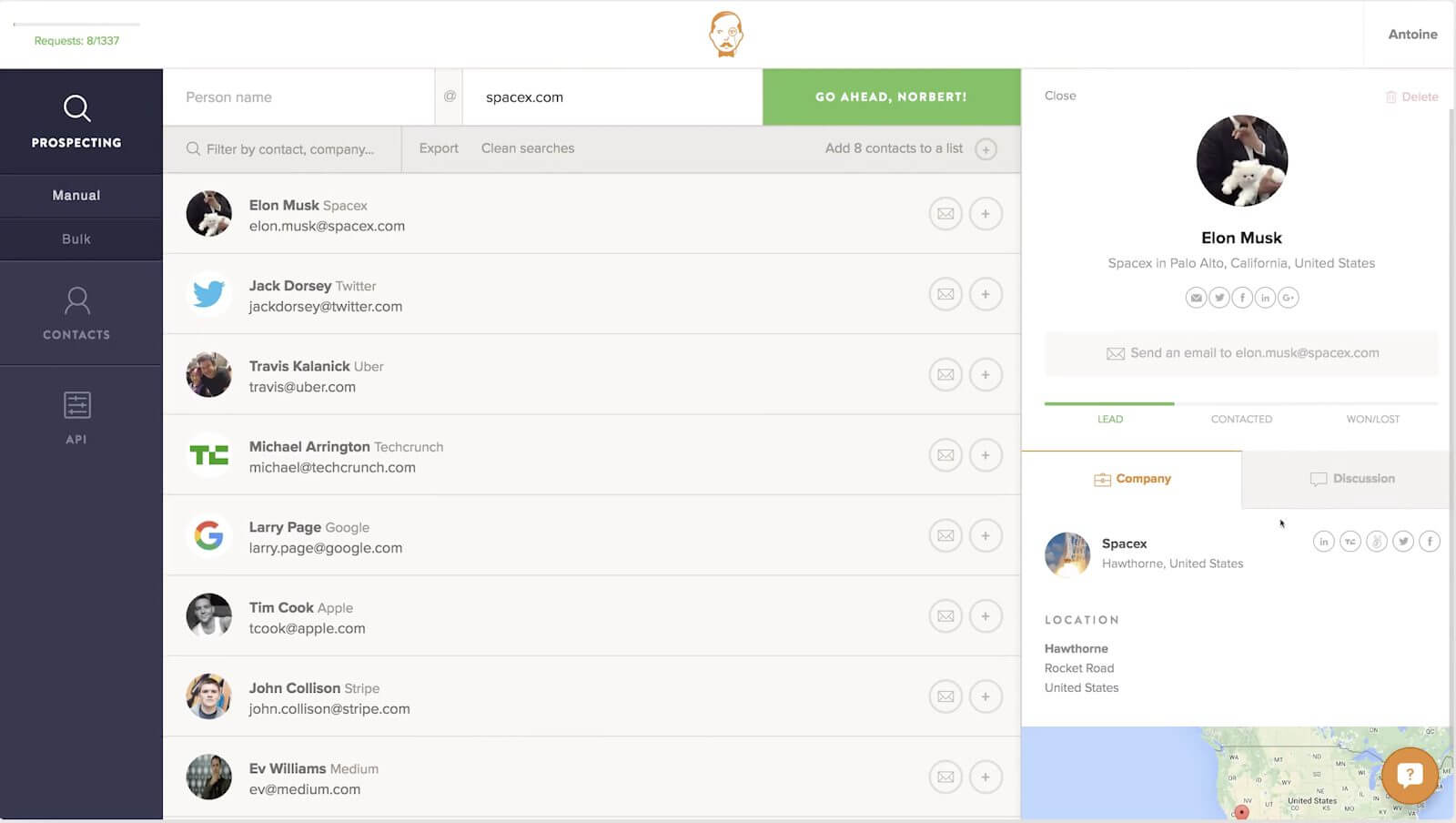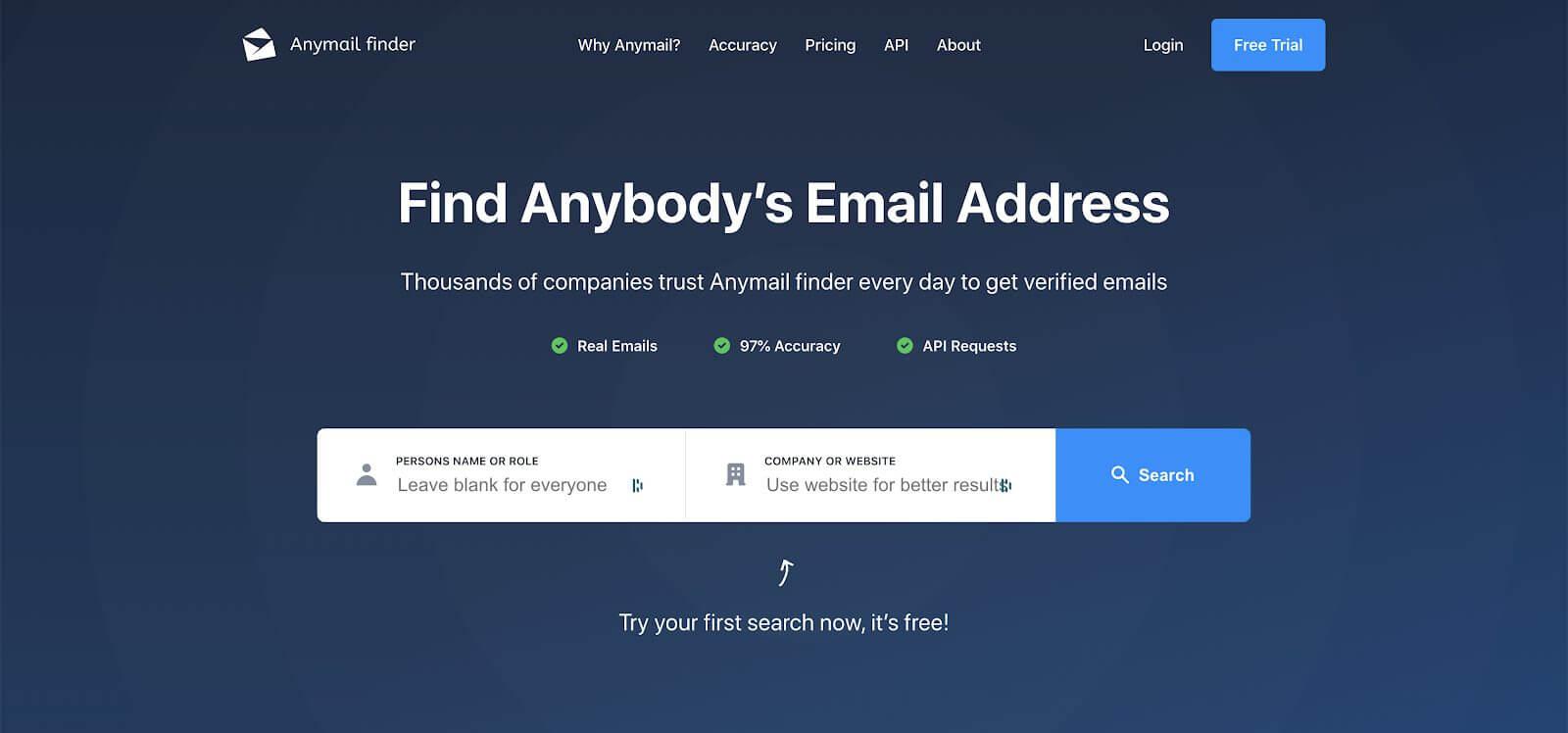Best Email Finder Tools Of 2021

Contents
Despite the many new communication platforms around nowadays, like Slack, Facebook Messenger, and many more, the vast majority of business communication still takes place on email. If you’re trying to reach a new prospect or a lead, email should be your go-to communication channel.
But finding the right business email for a prospect can be a challenge – nearly everyone has experienced the frustration of searching around on a company site, LinkedIn, or Crunchbase trying to find an email that’s nowhere to be found.
Email finder tools exist precisely to solve this problem. When you want to find someone’s email, you just type their name in the search, add in their website’s domain, and boom: your tool will (usually) return an accurate email in seconds.
How do you know the email is accurate? The best tools on the market use verification processes and large email databases to ensure accuracy of up to 98%. However, accuracy isn’t always guaranteed, so it’s important to choose a tool that you can trust.
What to Look for in an Email Finder Tool
Not all email finder tools are made equal. When you’re making your decision, you should look for a tool that checks these boxes:
Easy to Use
Email finder tools are supposed to make your life easier. If using the tool is just as hard as searching for the email itself, then there’s no point investing in it.
Look for tools with clean, intuitive user interfaces, and a search process that makes finding emails quick and easy.
Bulk and Individual Email Search
There are two kinds of searches that email finder tools offer: bulk and individual. Some tools offer both search types, but some only offer one or the other.
In a bulk search, you input a domain name, and the tool returns all the emails it can find for that domain. For example, searching for tesla.com might bring back elon@tesla.com, franz@tesla.com, and any other emails on that domain.
In an individual search, you input a person’s name and a domain, and the tool will find that person’s email for you. For example, if you want to find Elon Musk’s email, you’d input Elon Musk and tesla.com, and the tool might return elon@tesla.com.
Accuracy
As you might imagine, not every email that a tool returns will be accurate. The best tools have large databases of email addresses to help ensure accuracy and may even offer verification services for pre-existing email lists. VoilaNorbert, for example, has up to 98% accuracy and rates how certain it is that the email it provides is accurate.
The 10 Best Email Finder Tools
Now that we’ve covered what you should look for in an email finder tool, let’s break down some real world options you can choose from.
1. VoilaNorbert
Website: voilanorbert.com
Price: Starts at $49/month
Free option: 50 free leads

VoilaNorbert is one of the most well-known and polished email finder tools available. With both individual and bulk email search capabilities paired with a streamlined user interface, the tool offers a quick and easy way to search for business emails.
Accuracy is a major selling point for VoilaNorbert, which provides up to 98% accuracy for its email results. It also offers verification and enrichment services for pre-existing lists.
If you have a large team and want to integrate other software, you will be pleased to find that VoilaNorbert has a long list of integrations and is built to scale.
2. RocketReach
Website: rocketreach.co
Price: Starts at $49/month
Free option: 5 free leads
RocketReach is another easy-to-use email finder tool that also provides phone information in addition to email contact info. The tool offers bulk and individual search and allows users to filter their results with advanced search criteria for very precise results.
If you want to automate your searches, RocketReach’s API has your bases covered. The company also offers a Google Chrome extension so you can find contacts from LinkedIn, Crunchbase, and other similar websites.
RocketReach advertises a database of 430 million professionals from 17 million different companies. However, results in our testing were mixed, with some searches returning accurate results and others returning completely inaccurate contact info.
3. Hunter.io
Website: hunter.io
Price: Paid plans start at $49/month
Free option: 50 searches per month

Hunter.io sticks to the basics with solid bulk and individual email search capabilities. The tool is easy to use and provides a confidence score so users can get a better idea of how accurate any particular result is.
Like RocketReach, Hunter.io also comes with a Google Chrome extension to help you find emails for whatever website you’re currently on.
Overall, there isn’t a whole lot to say about Hunter.io, but that’s not a bad thing. The tool provides a simple and streamlined experience that saves users time when searching for B2B contact info.
4. Snov.io
Website: snov.io
Price: Starts at $39/month
Free option: 2 months free with an annual subscription

Snov.io is a decentralized email finder platform that also offers cryptocurrency tokens in addition to its main tool and CRM.
The tool allows users to conduct bulk and individual email searches along with a few other options like social URL searches and company profile searches. If you’re working with a team or want to store your data in another program, you can export prospect lists as a .csv, .xlsx, or a Google Sheet.
5. Vocus.io
Website: vocus.io
Price: $5/month
Free option: None

Vocus.io’s email finder tool is part of a larger suite for Gmail. While the email finder is a bit scant on features compared to others, it does have a very affordable price point of just $5/month.
Unfortunately, Vocus.io does not offer bulk searches, so that may be a deal breaker for some. To find an email, you simply type in the name and domain, and Vocus.io comes up with some possible emails. Then, it verifies those suggestions.
It’s simple, but if you’re on a budget, it may be worth looking into.
6. Skrapp
Website: skrapp.io
Price: Paid plans start at $34/month
Free option: 150 emails/month

Skrapp is likely the most technologically advanced email finder tool that we’ve looked into. Skrapp finds emails by scraping publicly-indexed web pages and predicting emails using algorithms that model company email patterns.
Like most tools, Skrapp offers both individual and bulk searches. It also offers a Google Chrome extension, an API for automated searches, and it allows users to export their results as a .csv and .xlsx.
7. FindThatLead
Website: findthatlead.com
Price: Starts at $49/month
Free option: None

FindThatLead’s standout feature is its social media search, which combs through social profiles, like LinkedIn, Instagram, and Facebook for email information. Additionally, it has some very powerful search features, like location and keyword search, that make it easy to hone in on a specific set of emails.
FindThatLead’s email verification tool works fast, so you can make sure you have the right email quickly and easily. Plus, you can use the Google Chrome extension to pick up emails while browsing through web pages.
8. Prospect.io
Website: prospect.io
Price: $39 for 50 credits
Free option: None

Like many of the other email finder tools on this list, Prospect.io offers both bulk and individual email searches. It also gives users access to its Google Chrome extension so you can find emails while browsing social profiles and websites.
If you’re looking to automate your email outreach process, Prospect.io’s API makes that a possibility. Plus, its email verification methods help ensure that every email you reach out to actually exists.
9. Lusha
Website: lusha.com/
Price: Paid plans start at $39/month
Free option: 5 credits/month

Unlike many tools on this list, Lusha works primarily as a Google Chrome extension. Essentially, it’s a way to enrich public B2B profiles with additional contact info, like emails and phone numbers.
As far as accuracy is concerned, Lusha has a database of 36 million C-level profiles, 100 million business profiles, and 15 million company profiles, so there’s a good chance Lusha has the data you’re looking for.
Plus, Lusha is compliant with GDPR and CCPA, so you can be sure you’re always staying on the right side of the law when you use it.
10. Anymail Finder
Website: anymailfinder.com
Pricing: $49/month
Free option: 90-email free trial

Anymail Finder prides itself on its ability to find accurate emails. In fact, you won’t even be charged for email results that don’t have a 97% or higher deliverability rate. This can help keep your costs down when you’re prospecting and ensure that you’re not wasting credits on undeliverable emails.
If you want to scrape LinkedIn or other social media sites, you can do that with one of Anymail’s partners, like Scoutzen or Dux-Soup.
For those that want to make use of automation, Anymail also offers an API. Alternatively, if you’re a bit new to tech and unsure how to use the tool, you can receive support via phone, email, and chat.






